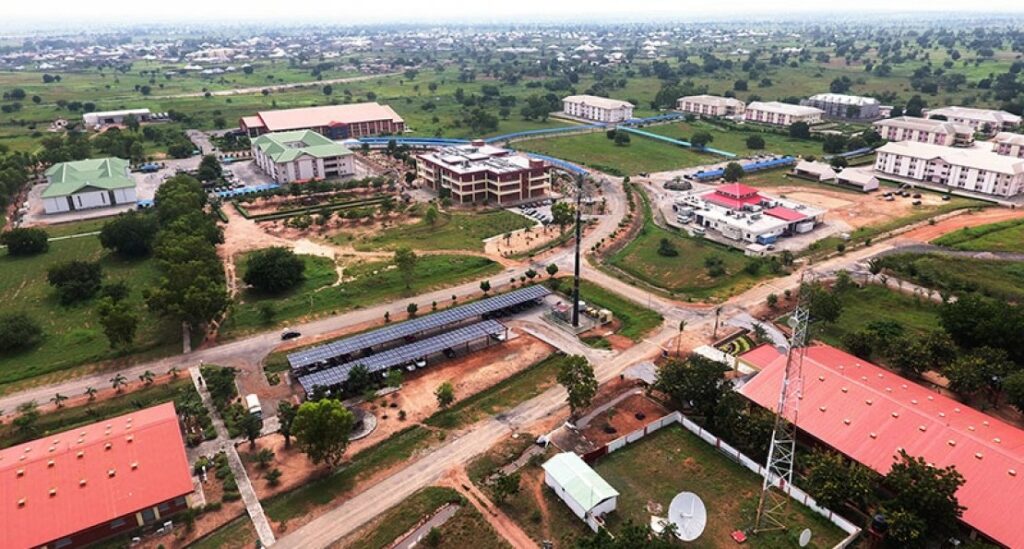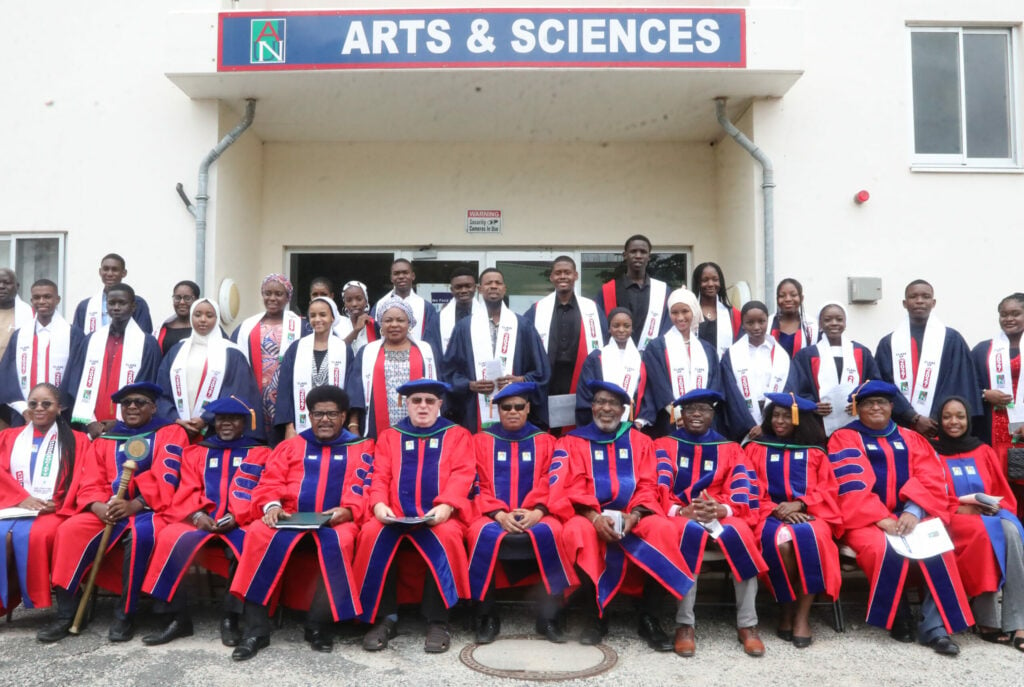Location:
Adamawa, Nigeria
Student Population:
9,000 Undergraduate Students
1,000 Graduate Students
CIC Network Membership:
Tuition Exchange Program

The American University of Nigeria (AUN) was founded by former Vice President Atiku Abubakar, GCON, in Yola, the capital of his home state of Adamawa, Northeast Nigeria. Having first established a private primary and secondary school, ABTI Academy (now AUN Academy) in 2002, Abubakar approached the American University (AU) in Washington, DC, for advice and assistance in establishing an American-style university. That university was licensed as ABTI University in 2003, and the ground was broken for the buildings in October 2004 on the land originally donated by the 11th Lamido Adamawa, the late Alhaji (Dr.) Aliyu Musdafa, CFR. Today, it is seated on more than 2,500 acres. The institution was conceived as a university which would focus on development issues while providing an education modeled after the best U.S. practices in content and pedagogy. The three constituent schools were Arts & Sciences, Business & Entrepreneurship, and IT & Computing. In 2007, the name of the institution was changed to its present name of American University of Nigeria (AUN). The pioneer class of 92 students graduated in 2009. Every class since then has graduated on schedule. AUN is located in Yola, the capital city of Adamawa State. The AUN campus occupies a serene savannah vegetation most of which was used as farmland. Adamawa, one of the six states in northeast Nigeria, shares the longest borderline with Cameroon. Yola is accessible by road and air, and daily flights from the Yola Airport connect through Abuja to regional, national, and international locations.
Expand Your International Reach
American University of Nigeria is looking to partner with U.S.-based institutions in the following areas:
Study Abroad
Faculty Exchange
Campus Visits
International Programs
- Study Abroad
- Faculty Exchange
- International Internships
- Global Research Collaboration



Academic Programs
Accounting
The overall goal of the Accounting Programme is to provide students the opportunity to develop advanced professional training in Accountancy. Specific objectives of the Programme include providing students opportunities to participate in solving business problems through case studies and other innovative learning approaches inside and outside the classroom.
Business Administration
Learn more about Business Administration
Chemical Engineering
The Chemical Engineering program is designed to train engineers who can cater to the needs of the bio/Petro-chemical industry of Nigeria and beyond. It prepares students for productive careers in both public and private sectors. It also serves as a sound foundation for graduate studies. The broad goal is to train budding engineers to design, develop, and operate chemical processes by which chemicals, petroleum products, food, pharmaceuticals, and consumer goods can be produced economically and safely with minimal environmental impact.
Communication and Multimedia Design
Our mission is to produce graduates who are agents of change – skilled in using modern multimedia forms to tell stories that can change their societies. Most of the courses are very practical and are deliberately designed to answer ‘how to’ questions. To accomplish this, the CMD program employs a flexible approach that allows students to become a Communication and Multimedia generalist or to specialize in any of the professional concentrations, including Public Relations & Advertising (PRAD), Journalism, Multimedia Design, and Radio/TV/Film. Each concentration offers a balanced mixture of basic and advanced laboratory and lecture courses. Laboratory courses sharpen students’ skills, while lecture courses enable students to view the profession from a variety of perspectives. Students also have the option to double-concentrate. Learn more about the Communication and Multimedia Design program.
Computer Engineering
The Computer Engineering program is designed to equip graduates who demonstrate an understanding of the fundamentals of digital and embedded systems with practical electronic and computing skills, and to optimally blend both the theory and practice to engineer solutions for problems in the industry, business, commerce, education, medicine, government, agriculture, and the society in general. It can also contribute to development and research in these areas.
Computer Science
The B.Sc. Program in Computer Science is designed with core courses that provide breadth and depth in the field, along with a strong theoretical component as a foundation for good software engineering and information systems. The program includes courses in the sciences and mathematics; general education requirements in the humanities and an in-depth sequence of specialized computer courses. The program provides a balance of both theory and practice in core courses covering both software and hardware through integrated lectures, laboratory sequences and individual and group projects often with direct application in the community or region.
Electrical/Electronics Engineering
The Electrical & Electronics Engineering program is designed to train students in the production and distribution of large-scale electrical power and systems. It is an important foundation for our Computer Engineering and Telecommunications Engineering degrees. It equips students with a sound knowledge of and practice in digital electronic systems in the industry as well as the engineering skills needed to design, assess, and develop electrical and electronic systems. The primary objective of the program is to train technical professionals equipped with the technological knowledge and skills to engineer systems such as power generation and supply, and communications and media.
Entrepreneurship & Management
New venture creation is the heart of business. The philosophy of the Bachelor of Sciences in Entrepreneurship & Management at the American University of Nigeria is to create, in our students, an awareness of the foremost theories in business venturing, and equip graduates of program with the mindset and tools required to effectively identify and exploit business opportunities in any business environment. This program is unique in Nigeria because its pedagogy is built on a blend of perspectives from multiple inter and intra national multicultural business environments, with an emphasis on local contexts.
Information Systems
The Information Systems program provides students with a solid foundation in information technology principles and practice. The emphasis is on applications of information technology rather than the computer and/or computing mechanisms per se. The core courses for the information systems major include programming, computer architecture, operating systems, data communication, systems analysis and design, database applications, and project management.
Software Engineering
Software Engineering is the application of engineering concepts, techniques and methods to the development of mission-critical software systems. The software engineering major builds on the computer science major with advanced course work in software architecture and design, software metrics, verification and validation, requirements analysis and specification and the software engineering process. The goal of our software engineering program is to develop technical professionals who can develop and deliver software systems that are reliable, cost effective and adaptable to developing country environments.
Telecommunications Engineering
This program emphasizes design, development, and applications of Electronics Engineering and Telecommunications Engineering. The students receive a sound background in modern electronic circuits and systems with a major focus in Telecommunications Engineering. They also receive a strong foundation in engineering science and design that will enable them to pursue productive careers in Telecommunications Engineering field.


